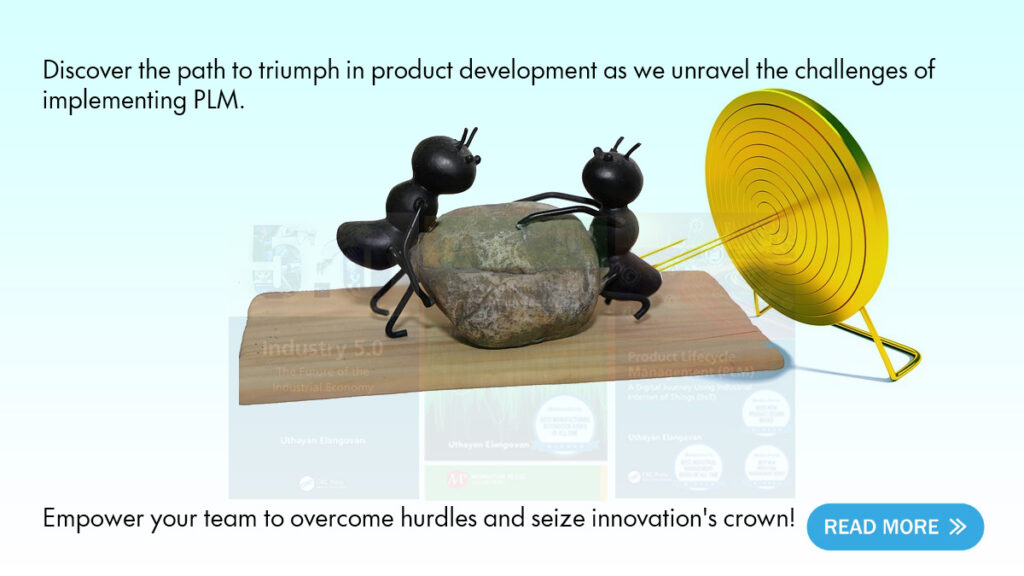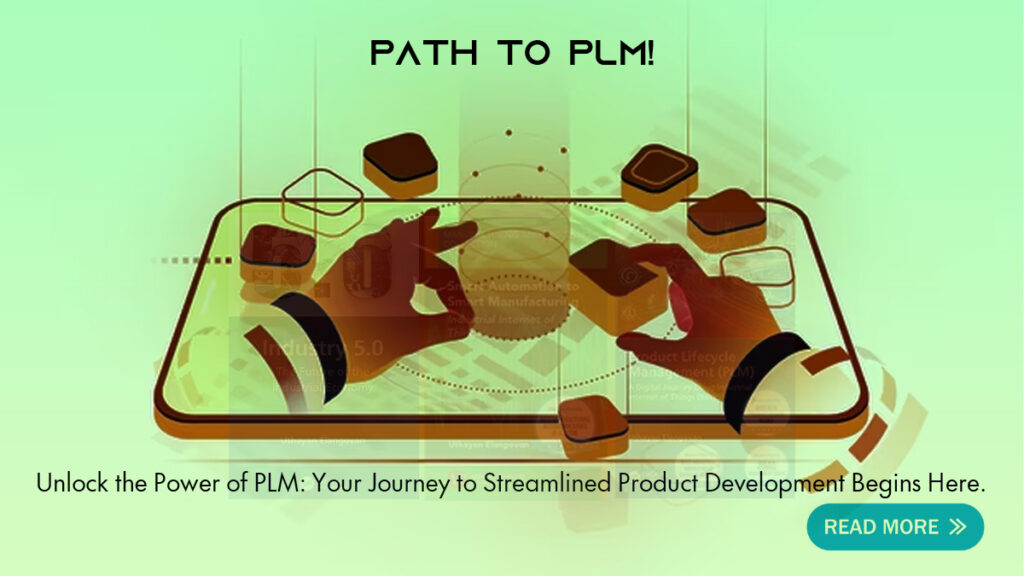In the ever-evolving landscape of product development, “Winning with PLM: Overcoming Implementation Hurdles” unveils the secrets to conquering the roadblocks that stand between businesses and the triumphant adoption of Product Lifecycle Management (PLM).

- Introduction:
- Challenge 1: Complex Implementation Process
- Challenge 2: Lack of Cross-Functional Collaboration
- Challenge 3: Data Quality and Integration
- Challenge 4: Resistance to Change
- Challenge 5: Cost and Return on Investment (ROI) Concerns
- Challenge 6: Keeping Up with Technological Advancements
- Conclusion:
Introduction:
In the world of world of product development, where innovation reigns supreme, mastering the art of Product Lifecycle Management (PLM) is the key to unlocking the doorway to success. It offers numerous benefits, such as increased efficiency, reduced time-to-market, and improved collaboration. However, despite its advantages, many customers struggle with using PLM to its full potential. In this article, we will explore the common challenges faced by customers in adopting PLM and discuss effective mitigation strategies to empower them in harnessing the full potential of this technology.
Challenge 1: Complex Implementation Process
One of the primary challenges customers encounter with PLM is its complex implementation process. Integrating PLM into an existing infrastructure can be overwhelming, often requiring extensive customization and data migration. The fear of business disruption and the time-consuming nature of implementation can lead to resistance from stakeholders.
Mitigation:
- Adequate Planning: Create a comprehensive roadmap that outlines the stages of implementation, identifying potential risks and challenges early on.
- Skilled Implementation Team: Engage with experienced PLM vendors who can guide and support throughout the process.
- Training and Education: Provide training to employees, ensuring they understand the benefits of PLM and how to use it effectively.
Challenge 2: Lack of Cross-Functional Collaboration
PLM systems are designed to facilitate collaboration across different departments and teams involved in product development. However, customers often struggle to encourage seamless communication and cooperation among stakeholders from engineering, design, manufacturing, and marketing.
Mitigation:
- Clear Communication Channels: Establish well-defined communication channels to ensure all relevant stakeholders can access and share information easily.
- Encourage Teamwork: Foster a collaborative culture within the organization to break down silos and promote knowledge sharing.
- Role-Based Access: Implement role-based access control to ensure that employees have access only to relevant data, safeguarding sensitive information.
Challenge 3: Data Quality and Integration
Inconsistent or poor-quality data can hamper the effectiveness of a PLM system. Many organizations grapple with data scattered across various legacy systems, making it difficult to integrate and maintain accurate information within the PLM platform.
Mitigation:
- Data Cleansing: Invest time in cleaning and validating existing data before migration to ensure the integrity of information.
- Standardization: Develop data standards and protocols to ensure uniformity across the PLM system.
- Integration Tools: Employ integration tools to facilitate seamless data exchange between PLM and other enterprise systems.
Challenge 4: Resistance to Change
Introducing PLM often requires a cultural shift within the organization. Employees might resist change due to fear of the unknown, disrupting familiar processes, or concerns about job security.
Mitigation:
- Top-Down Support: Secure buy-in from senior management to communicate the importance of PLM implementation and its benefits.
- Incentives for Adoption: Offer incentives to encourage employees to embrace PLM and actively participate in its implementation.
- Gradual Rollout: Introduce PLM in phases, allowing employees to acclimate to the changes gradually.

Check the the first steps to take towards PLM implementation in your organization.
Challenge 5: Cost and Return on Investment (ROI) Concerns
PLM implementation can be a substantial investment, leading some customers to question its ROI and long-term benefits.
Mitigation:
- ROI Analysis: Conduct a thorough cost-benefit analysis to highlight the potential returns and justify the investment.
- Scalability: Choose a PLM solution that can scale with the organization’s growth, ensuring long-term value.
- Success Metrics: Establish clear success metrics to measure the impact of PLM implementation on key performance indicators.
Challenge 6: Keeping Up with Technological Advancements
Technology is ever-evolving, and PLM systems need to adapt to the latest advancements to remain effective. However, customers may struggle to keep up with the rapid pace of technological changes.
Mitigation:
- Vendor Support: Partner with PLM vendors that offer regular updates and continuous support to keep the system up-to-date.
- Community Involvement: Engage with PLM user communities and forums to stay informed about the latest trends and best practices.
- Future-Proofing: Prioritize flexibility when selecting a PLM system to accommodate future technological developments.
Conclusion:
While the challenges in adopting PLM are real, they can be overcome with careful planning, effective communication, and a commitment to change. By addressing the implementation complexities, fostering collaboration, ensuring data quality, managing resistance, justifying costs, and staying up-to-date with technology, customers can unlock the full potential of PLM. Empowering customers with the right strategies will not only optimize their PLM experience but also lead to enhanced product innovation, improved efficiency, and sustained growth in the competitive market landscape.
Are you ready to take your manufacturing business to new heights with a robust PLM implementation? Connect with Neel SMARTEC, the industry-leading PLM business consulting services, for a smooth and cost-effective journey. Our experienced team is committed to tailoring the perfect PLM solution for your unique needs. Connect with us to schedule a consultation today and unlock the true potential of your product development process. Let’s embark on this transformative PLM journey together!


